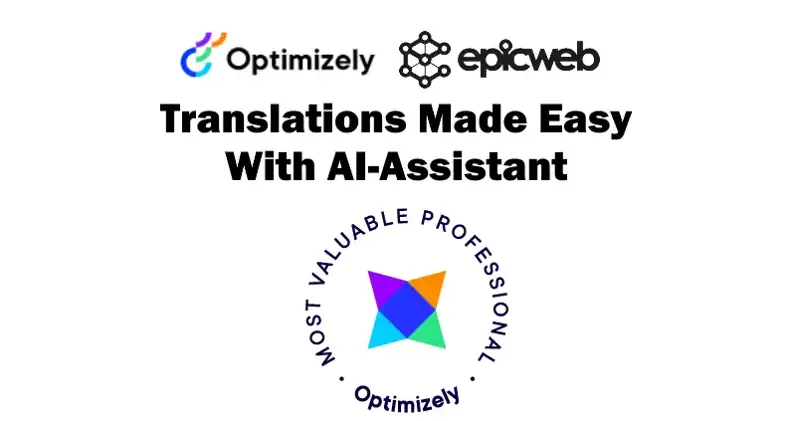
Working with Translations in Optimizely
Ensuring that content is accessible and comprehensible in multiple languages is essential for any global business. Optimizely, combined with Language Manager and Epicweb AI-Assistant, provides strong translation capabilities, making the process smooth and efficient. The integration of Epicweb AI-Assistant enhances these capabilities, offering a high degree of configurability for customized translation experiences. This post examines the key features and implementations that facilitate straightforward and effective translation work in Optimizely.
Key Features of the Epicweb AI-Assistant's Translation Capabilities
The Epicweb AI-Assistant's translation features are designed to cater to various needs, whether you're dealing with single fields or entire pages. Here are some of the standout features:
1. Translate One Field at a Time: This feature provides precision, allowing you to focus on translating specific fields without affecting other content. It’s particularly useful when only parts of a page need to be updated or when testing translations on specific sections.
2. Translate All Fields on a Page or Block Type with the LanguageManager Plugin: For a more comprehensive approach, the LanguageManager plugin allows you to translate all fields on a page or block type in one go. This feature is ideal for large-scale content updates where consistency across all fields is essential.
3. Connect Any AI Vendor: One of the most significant advancements in our AI Assistant for Optimizely is the ability to connect any AI vendor or translation services to all fields within the CMS and Commerce. This flexibility allows businesses to choose the AI services that best meet their needs, ensuring that their translation processes are as efficient and accurate as possible.
Video: Translations with Language Manager + AI-Assistant:
How Do Translations Work?
The AI-Assistant’s translation capabilities are powered by various AI vendors and LLMs, including OpenAI, which supports over 86+ languages. This extensive language support ensures that businesses can reach a global audience with translations that are not only accessible but also highly accurate. OpenAI's translation service, among others, is recognized for delivering some of the most precise and high-quality translations available worldwide.
One of the key advantages of using this service is the ability to provide specific terms or translation guidelines. These guidelines allow businesses to tailor the translation process according to their specific needs, ensuring that industry-specific terminology, brand language, and regional nuances are accurately captured. This level of customization helps maintain consistency and relevance across all translated content.
New Features for Enhanced Customization
We've introduced several new features in our AI Assistant for Optimizely, significantly enhancing the customization options available to users. A highlight of these updates is the ability to customize AI instructions for each translation language. This includes the option to use different AI models for different languages, providing unparalleled flexibility in managing multilingual content.
This feature allows customers to:
- Include Specific Translation Guidelines: Tailor the translation process to reflect the unique requirements of each language, ensuring that critical terms and brand-specific language are accurately translated.
- Use Specially Trained Models for Each Language: For businesses that operate in highly specialized fields or regions, the ability to use different AI models for different languages ensures that translations are not only accurate but also contextually appropriate.
- Customize AI Instructions Per Language: This ensures that each language's unique characteristics are considered, making the translation process more nuanced and precise.
Google Translation Hub Integration
With a custom integration of Google Translation Hub, businesses can leverage the power of Cloud Translation to dynamically translate content across multiple languages.
Moreover, the support for Glossary and translation memory allows businesses to maintain consistency in terminology and improve translation accuracy over time. This means that specific terms related to a brand or product can be translated uniformly across all content, enhancing brand identity and customer experience.
By connecting Google Translation Hub to the AI Assistant for Optimizely, businesses can streamline their translation workflows, reduce manual effort, and ultimately provide a better experience for their multilingual customers.
Implementing IAssistantInstructionsResolver
The implementation of the IAssistantInstructionsResolver interface is central to customizing translation instructions across different languages. This interface is crucial for businesses that require flexibility in how translations are handled, providing the ability to implement global 'Assistant Instructions' while also allowing for variations between languages if necessary.
Here’s a look at the interface:
public interface IAssistantInstructionsResolver{ string GetInstructions(CultureInfo language); string GetInstructionsForTranslations(CultureInfo toLanguage, CultureInfo? fromLanguage = null);}
This interface allows for the customization of instructions that guide the translation process, ensuring that the AI Assistant follows specific rules and guidelines tailored to each language's needs.
Introducing IAssistantModelResolver
In addition to the IAssistantInstructionsResolver, we have also introduced the IAssistantModelResolver interface. This interface is designed to offer even greater flexibility in managing translations by allowing the selection of different AI models based on language requirements.
Here’s the interface:
public interface IAssistantModelResolver{ string GetModelForTranslations(CultureInfo toLanguage, CultureInfo? fromLanguage = null);}
The IAssistantModelResolver interface enables businesses to:
- Select AI Models Based on Language: This is particularly useful for organizations that operate across diverse linguistic regions and require different AI models to handle the nuances of each language effectively.
- Enhance Translation Accuracy: By selecting the most appropriate AI model for each language, businesses can ensure that translations are not only accurate but also contextually relevant.
- Tailor the AI Model to Specific Needs: Whether it’s a general-purpose model or a specially trained one for a particular industry or locale, this interface provides the flexibility needed to meet diverse translation requirements.
Leveraging the "GetInstructionsForTranslations" and "GetModelForTranslations" APIs
When working with translations in Optimizely, the GetInstructionsForTranslations and GetModelForTranslations APIs are essential tools. These APIs allow for a high degree of customization in the translation process:
- GetInstructionsForTranslations: This API allows you to provide translation instructions tailored by language, ensuring that translations are conducted according to specific guidelines.
- GetModelForTranslations: This API enables the selection of the most suitable AI model for each language, enhancing the translation's accuracy and contextual relevance.
These APIs, when used in tandem, offer a comprehensive solution for managing translations across multiple languages with precision and consistency.
Examples working with AI-Assistant and Translations
Scenario 1: English to Swedish Context Conversion: If you have an English page with text in the "page description" property, simply change the context to Swedish, spin the wheel, and watch as the addon automatically translates the field. It simplifies the localization process, allowing you to cater to specific language preferences.

Scenario 2: English to Swedish Translation: When working in a Swedish context, paste the English text into the addon, spin the wheel, and witness the automatic translation into Swedish. It's quick, accurate, and saves you the hassle of manual translation.

Scenario 3: Translate Text to Any Language: No matter the language, the addon can translate your text effectively. From Spanish and French to Chinese and Arabic, the multilingual text translation feature ensures your message reaches a global audience.

Conclusion
Optimizely, combined with Language Manager and Epicweb AI-Assistant, offers a robust and highly configurable solution for businesses looking to manage multilingual content effectively. By leveraging features like field-specific translations, the comprehensive LanguageManager plugin, and the ability to connect any AI vendor, along with implementing custom assistant instructions and fine-tuned models, you can ensure that your translations are precise, consistent, and tailored to your global audience's needs.
The recent additions to our AI Assistant, including the ability to customize AI instructions per language and the option to use different AI models for different languages, provide unparalleled flexibility and precision in managing translations. These innovations ensure that your content remains relevant and impactful, regardless of the language. Stay tuned for more updates as we continue to enhance our translation capabilities to meet the needs of a global market.
Book a meeting to get started!
We offer a one-hour introduction meeting about our AI Assistant for Optimizely CMS 12. (Swedish or English)
The AI Assistant: This is what you get
Feature-Rich for Enhanced Editorial Efficiency
Epicweb's AI Assistant comes with an impressive array of features:
-
Text Suggestions and Alternatives: Enhance your writing with AI-generated phrasing and alternative variations.
-
Multilingual Translation: Seamlessly translate your text into multiple languages while preserving formatting and style to reach a diverse audience.
-
SEO, AEO and GEO: Generate optimization content for search engines and AI search.
-
Prompt Pro Assistance: It saves time and helps you get more out of your ideas, instantly.
-
Image AltText Analyzer: Advanced AI capabilities to analyze images and automatically populate media object properties
-
Image Generation: Create relevant and engaging images that complement your content.
-
Image Transformer: Take any image, enhance it, and add new elements with AI-powered creativity. Transform the way you interact with images.
-
New Text Generation: Generate fresh content that keeps your audience engaged.
-
Text Summarization: Quickly condense long texts into concise summaries, saving time and maintaining essence, perfect for SEO descriptions.
-
HTML Formatting: The AI-Assistant offers a range of formatting capabilities within the Rich Text Editor. WCAG Compatible.
-
Spell-Checking: Ensure your content is error-free and professionally polished.
-
Tone Adjustment and Consistency: Adapt your content’s tone to suit its purpose and maintain a consistent brand voice.
-
Keyword Extraction: Identify and extract key terms from your text for SEO optimization.
-
Custom Prompts with ChatGPT: Leverage the power of ChatGPT to run your own prompts for unique content creation.
-
Custom Shortcut Prompts: Add your own shortcuts for frequently used commands, connect tools and enhancing productivity.
-
Inline ChatGPT Help: Use ChatGPT or Google GEMINI directly within the platform for instant assistance.
-
Tools for AI: Connect your C# Function Calling or MCP tools directly to the AI Assistant, enabling custom integrations.
-
RAG (Retrieval-Augmented Generation): Connect your own knowledge base for AI responses powered by your organization’s internal data.
Streamlined Integration into Optimizely
The AI Assistant is seamlessly integrated into every field within the Optimizely CMS and Commerce platform, ensuring that these powerful features are accessible right where you need them, in the editor mode.
Getting Started with The Epicweb AI-Assistant:
To get started with the free evaluation, simply fill in the form in our website to get started and download the addon to your Optimizely CMS and Customizable Commerce platform from the Optimizely Nuget feed.
Follow our beginner-friendly guide or dive deep with our comprehensive documentation.
Installation is quick and easy, allowing you to start harnessing the power of AI assistance in no time.
Book a meeting to get started!
We offer a one-hour introduction meeting about our AI Assistant for Optimizely CMS 12. (Swedish or English)
Note: This blog post has been enhanced with the help of the AI-Assistant for Optimizely.
Unleash the power of AI in Optimizely to boost your content management.
